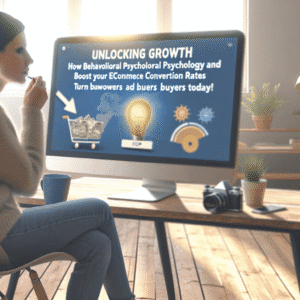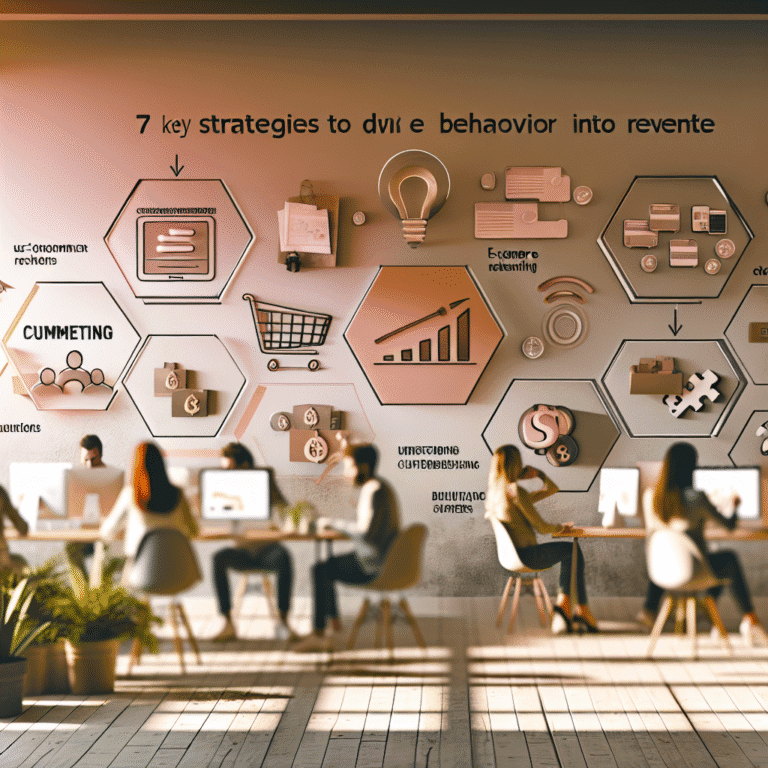Why Your Shoppers Aren’t Buying (And How Psychology Can Help Fix It)
Picture this: your online store’s looking spiffy. It’s quick, clever, and meant to turn lurkers into buyers. But for some reason, your sales chart isn’t beating too many records. You’ve got genuine people visiting, but they’re leaving without ponying up their cash. Here’s the twist: it’s not the tech. It’s how people tick.
Folks shop in stories, not straight lines. Understanding how minds work can be your secret sauce. Let’s chat about why bringing in a bit of behavioural psychology might just save the day.
Emotions Drive Purchases
Mess around with button colours all you like. But if you miss the big picture, it won’t help. The truth is, emotions, not logic, drive buying decisions.
- We don’t care if the page loads in a jiffy
- We care if it makes us feel bold, eager, secure — right from the start
Turning those feelings up a notch moves you from dull numbers to real motivation. And it’s about creating connections, not boring fixes.
Here’s some brainy stuff:
- Daniel Kahneman reckons decisions are often swift and emotional.
- BJ Fogg believes motivation, ease, and a nudge are key to action.
- Thaler and Sunstein suggest that little nudges can drive big changes.
If you’re after fewer abandoned carts, learn the dance of decision-making. It’s where the magic happens.
What Gets Shoppers Clicking
Every time a shopper clicks or adds something to the cart, three forces are at play:
- Do I fancy this?
- Is it easy to bag?
- What’s giving me a nudge?
BJ Fogg strikes again with his model. Here’s how it plays out online:
- Homepage: Sells a vibe. Not just trainers, but the life you lead in them.
- Product Page: It should be clear as a bell and tempting.
- Cart & Checkout: Sealing the deal or time to bail.
The trick is to cater to feelings, not just how to spend. Want to dive deeper? Check out BJ Fogg’s Behaviour Model.
Enough theory! Let’s talk application.
Ten Tricks to Banish Abandoned Carts
The best online shopping feels like serendipity. Here are ten psychological principles to gently nudge shoppers towards hitting “buy”.
1. Social Proof
People trust people, not glitzy brands.
- Splash up reviews and popular buys.
- It’s reassurance baked in social proof.
2. Scarcity
Fear of missing out makes decisions quicker.
- A cheeky “Only a few left” goes a long way.
- Honest scarcity builds trust, fibbing shatters it.
3. Anchoring
First impressions linger — especially with pricing.
- Showcase discounts alongside original prices.
- Bundles change the game by setting a new anchor.
4. Loss Aversion
Losses weigh heavier than gains.
- Remind them what they might lose, not just offers.
- Nudges about scarcity work wonders.
5. Reduce Effort
Shoppers will leg it if it seems a faff.
- Present the juicy bits upfront.
- Trim unnecessary clicks and fields.
6. Reciprocity
A little kindness goes a long way.
- A personalised code or styling tips build trust.
- People return the favour with purchase loyalty.
7. Default Preference
We’re creatures of habit, defaults sway us.
- Suggest bundles by default.
- Feature best-sellers automatically.
8. Keep It Simple
If your page is a headache, it’s a buyer’s nightmare.
- Simplify your language and layout.
- Clear CTAs like “Add to Cart” do the trick.
9. Stick To It
Once folks start, they’ll usually finish.
- Let them favourite stuff or keep carts saved.
- Emotional commitment keeps them coming back.
10. Future Regret
Shoppers act to dodge future blues.
- Highlight limited-time offers.
- Don’t let them dither or delay.
A Real Example of How This Works
Take a skincare brand that was going nowhere fast. They shifted from selling singles to making trio packs the norm, with savings front and centre. Conversions shot up by 18%, and average order value rose £5. Not a bad trade-off for tweaking perception, right?
Rethink Before Redesign
Before getting carried away with the next big revamp, ask yourself:
Is it the look or the feel that’s throwing people off?
Eliminate that shopper uncertainty:
- “Does my funnel flow easily?”
Should become: - “Are we making shoppers feel good here?”
Get a nudge from tools like Hotjar to pinpoint where buyers pause. Tweak words and timings with Convert or Optimizely. Aim to guide — not to shout.
Convert Online Without a Hitch
You’re not your shopper. Their whims and quirks — that’s normal. You can’t always reason with them, but you can make their path clearer.
When you cut through the psychological hurdles, it’s not trickery. It’s about showing you get them. Providing an experience that’s human. Get your shoppers to not just add but actually complete the purchase.





